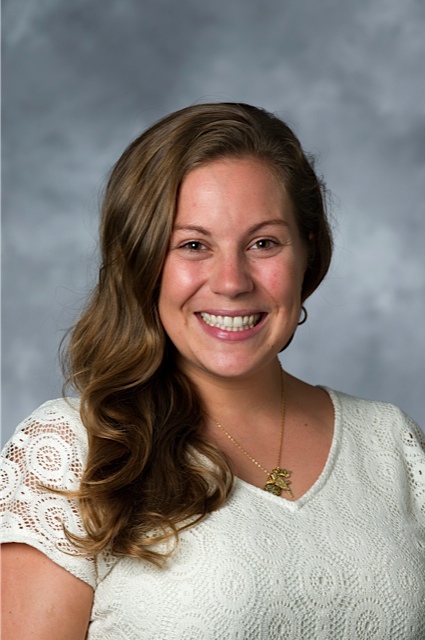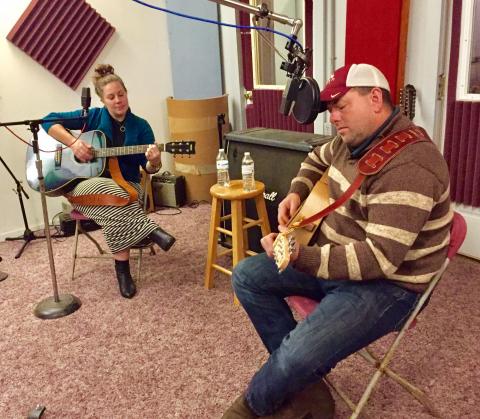Berklee Alumna Uses Music Therapy to Help Heal the Wounds of War
cdef.jpg)
President Barack Obama plays the drums while Rebecca Vaudreuil B.M. '08 works with a patient at Walter Reed National Military Medical Center.
Image by Pete Souza

Rebecca Vaudreuil B.M. '08
Image by Resounding Joy

Rebecca Vaudreuil works with Master Sergeant Michael Schneider at Walter Reed National Military Medical Center in Bethesda, Maryland.
Image by Bill O'Brien
Master Sergeant Michael Schneider retired from the Marine Corps in 2015 with the signature mental wounds now endemic among wartime soldiers. He had post-traumatic stress disorder, and a traumatic brain injury that damaged a 4-centimeter strip of his right temporal lobe.
“I needed something to get around that section and relearn pieces and refire brainwaves,” Schneider said in a podcast and article for the National Endowment for the Arts (NEA). “And music therapy was it.”
With the help of music therapist Rebecca Vaudreuil B.M. ‘08, Schneider said he “found a new space in my brain that opened up that I never knew I had. And [music] seemed to be the one thing that helped kind of bypass my injury.”
Schneider was one of Vaudreuil’s first patients at Walter Reed National Military Medical Center, where she treated veterans with traumatic brain injury and PTSD. She is one of the few music therapists in the country working with active military members, and the only such therapist for two years at an integrative traumatic brain injury program at the nation’s flagship military medical center, thanks to funding from the Creative Forces: NEA Military Healing Arts Network.
Songs of Recovery
Vaudreuil uses music to help military service members reach nonmusical goals. For example, a patient working on regaining coordination might reach motor goals by learning to play a musical instrument. Someone in a state of chronic, trauma-induced hyperventilation might sing to learn how to regulate breath and, by extension, heart rate.
One of Vaudreuil’s favorite activities is songwriting, and the patients have material to work with since many of the therapies for PTSD encourage writing and processing narratives. “Many patients come in here with loaded notebooks of writing samples,” she said. “The songs written by service members are really something spectacular—so authentic.” Vaudreuil helps patients create music to match their lyrics, with the idea that they will work toward resolution of their challenges by expressing their experiences through music and processing the final products, their original songs.
Vaudreuil, who majored in music therapy at Berklee, came to Walter Reed from San Diego, where in 2010, she developed and implemented the first regular music therapy program on any military base in the country, through a nonprofit organization, Resounding Joy, and seed money from the Semper Fi Fund. It proved so popular that by February 2011 the program was operating on two more bases. She recently left Walter Reed and returned to San Diego to continue developing programs for service members and veterans.
Coming Full Circle
As an organized discipline, music therapy began as an initiative in the 1950s whereby community musicians would go to veterans' homes and play music for them. And though music therapy is still used at veterans hospitals, the Department of Defense had no such regular programs for its charges.
While music therapy is still not widely accepted, especially in traditionally conservative military circles, it's making inroads, said Brittany Costa, department coordinator for Berklee’s Music Therapy Department. In fact, President Obama visited Walter Reed and talked with Vaudreuil about music therapy in August 2016.
“Everyone is just so used to ‘if you have an issue you take this medication,’ instead of 'oh, you have this issue, put on these headphones,' said Costa, who has been a member of the U.S. Army Reserves for the past 10 years and plays clarinet in a military band.
The Music Therapy Department is interested in getting more involved with the military population and for the past three years has held a psychotherapy practicum at Chelsea Soldier’s Home, where students work with people with dementia and Alzheimer’s disease. The department is also working on a pilot program with the William Joiner Institute for the Study of War and Social Consequences, at the University of Massachusetts Boston, and is looking into ways for students to work with veterans suffering from PTSD, depression, and anxiety.
This would be a boon to an underserved population since, as Schneider, the retired master sergeant, said, he lost much of his access to therapy when he retired. And the music therapy program at Walter Reed changed the course of his life.
“I can tell you from so many of my buddies that music and art were a couple of things that saved their lives. Music saved my life,” he said.